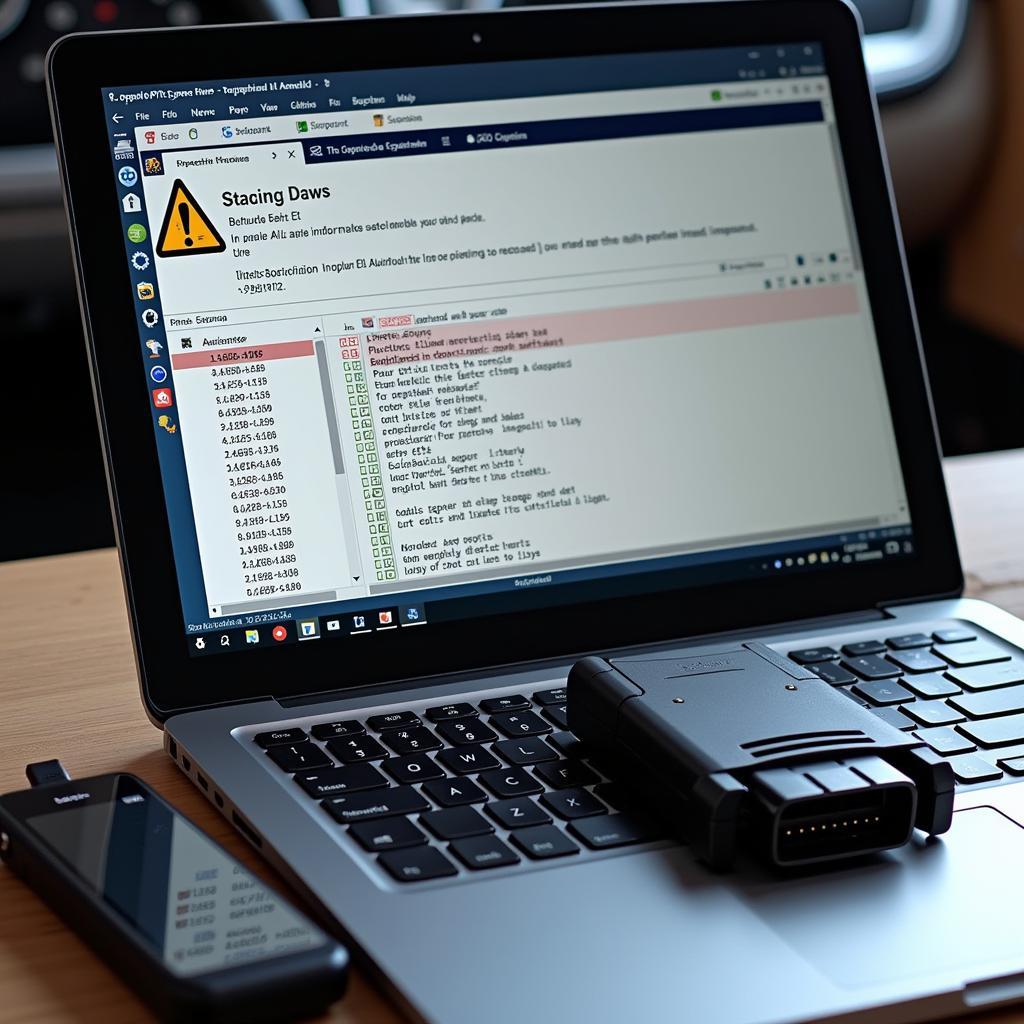Owning a Porsche is a dream for many, but even these masterpieces of engineering occasionally require attention. Understanding the complexities of modern Porsche vehicles can be daunting without the right Porsche diagnostic tools. This comprehensive guide will delve into the world of Porsche diagnostics, exploring their importance for owners, repair shops, and technicians alike.
Why are Porsche Diagnostic Tools Important?
Gone are the days of simple mechanics. Today’s Porsches are equipped with intricate electronic systems controlling everything from engine performance to comfort features. When a problem arises, a fault code is triggered and stored in the vehicle’s onboard computer. This is where Porsche diagnostic tools become indispensable. These tools act as a direct line of communication with your Porsche, allowing you to:
- Retrieve and interpret fault codes: Decipher cryptic codes and understand the root cause of issues.
- Monitor live data streams: Observe sensor readings in real-time to analyze system performance and identify irregularities.
- Perform advanced diagnostics: Access module-specific information and execute tests to pinpoint the faulty component.
- Carry out programming and coding: Update software, configure control units, and customize vehicle settings.
Types of Porsche Diagnostic Tools
The market offers a wide range of diagnostic tools, each catering to different needs and budgets.
1. Basic OBD-II Scanners
These handheld devices are widely available and provide a basic level of diagnostic functionality. They can read and clear generic fault codes (DTCs) related to engine and emissions systems. While suitable for simple tasks, they lack the depth required for comprehensive Porsche diagnostics.
2. Porsche-Specific Scan Tools
As the name suggests, these tools are designed explicitly for Porsche vehicles. They offer a significant leap in functionality, allowing access to manufacturer-specific codes, live data from all modules, and advanced diagnostic procedures. These tools are further categorized into:
- Handheld Scanners: Portable and user-friendly, ideal for DIY enthusiasts and smaller workshops.
- PC-Based Systems: Offer unmatched diagnostic depth, advanced programming capabilities, and regular software updates. They often require a laptop and a dedicated interface for vehicle communication.
3. Remote Diagnostics and Programming
Remote diagnostics is revolutionizing the automotive service industry. This technology allows technicians to access a vehicle’s onboard systems remotely, perform diagnostics, and even program software updates without physically being present. This offers significant advantages in terms of convenience, speed, and efficiency.
Choosing the Right Porsche Diagnostic Tool
Selecting the appropriate tool depends on individual needs and intended use.
For Porsche Owners: A basic OBD-II scanner might suffice for checking engine codes and monitoring basic parameters. However, for more in-depth diagnostics and customization, investing in a Porsche-specific handheld scanner is recommended.
For Independent Workshops: A professional-grade Porsche-specific scan tool is crucial. Consider factors like coverage for all Porsche models, access to technical data and wiring diagrams, and the availability of software updates and technical support.
For Specialized Porsche Service Centers: PC-based systems with comprehensive diagnostic capabilities, programming functionalities, and access to online databases are essential for dealing with complex repairs and software-related issues.
The Future of Porsche Diagnostics
The automotive industry is rapidly evolving, and so are diagnostic tools. Expect to see:
- Increased integration of cloud-based services: Seamless access to technical information, software updates, and remote diagnostic capabilities.
- Data-driven diagnostics: Utilizing vehicle data and predictive analytics to anticipate potential issues and optimize maintenance schedules.
- Augmented and virtual reality applications: Assisting technicians with complex procedures and providing interactive troubleshooting guides.
Conclusion
Porsche diagnostic tools are vital for understanding, maintaining, and repairing these sophisticated machines. Whether you’re an owner, a workshop, or a technician, having the right diagnostic equipment can save time, money, and frustration. As technology advances, these tools will continue to evolve, offering even more powerful and efficient solutions for keeping your Porsche running at its peak performance.
Need help diagnosing your Porsche or looking for expert assistance? Contact Cardiagtech, your trusted partner for all things Porsche diagnostics.
Call us: +1 (641) 206-8880
Email: CARDIAGTECH[email protected]
Visit us: 276 Reock St, City of Orange, NJ 07050, United States
Frequently Asked Questions
1. Can I use a generic OBD-II scanner on my Porsche?
Yes, but it will only provide access to basic engine and emissions-related codes.
2. What is the difference between PIWIS and Durametric?
Both are popular Porsche-specific diagnostic tools, but they differ in features, functionalities, and price points.
3. Do I need technical skills to use a Porsche diagnostic tool?
The level of technical expertise required depends on the tool’s complexity and the intended tasks.
4. Can I program my Porsche myself?
While possible with certain tools and knowledge, it’s generally recommended to leave programming to experienced professionals.
5. How often should I perform diagnostics on my Porsche?
It’s advisable to run diagnostics at least annually or whenever you experience unusual vehicle behavior.


